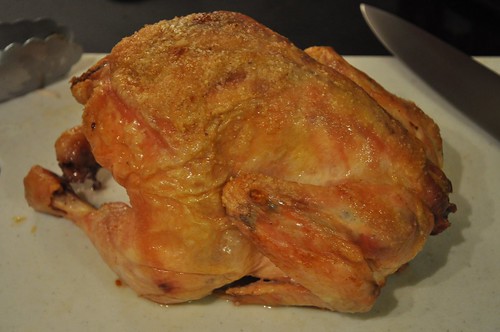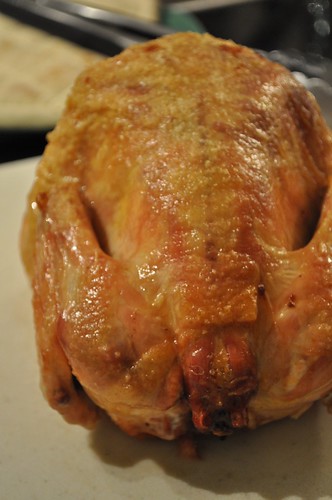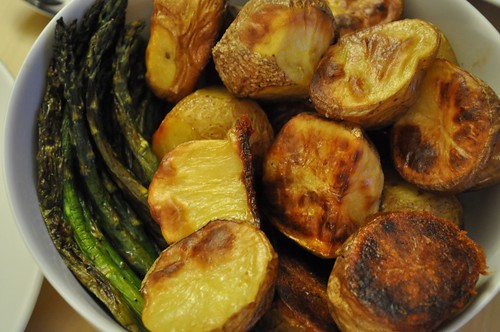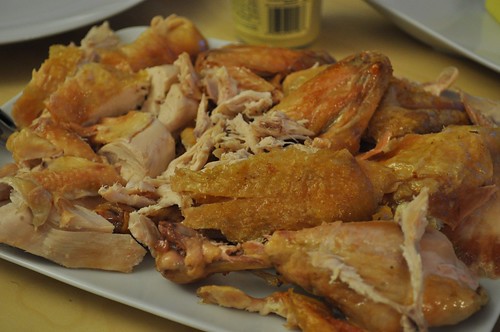To Meat or Not To Meat
Last week, for the first time in four months, I cooked meat in our kitchen. For the first time in my life, I roasted and carved a whole chicken. And, after carefully reviewing the photos, I’m pretty certain I roasted the poor bird upside down.
Aside from the fact that turning it over would have resulted in something that looked slightly less like the Rancor, it came out beautifully. I used the recipe for Thomas Keller’s “favorite simple roast chicken.” The skin was salty and crisp, the meat was unbelievably tender and juicy. Not to toot my own horn—though I suppose I’d actually be tooting Mr. Keller’s here—but it was by far the best roast chicken I’ve ever eaten.
Credit is also due to the farmer here. This particular chicken came to us from Herondale Farm a couple hours north of NYC. Herondale raises certified organic, grass-fed beef and lamb, as well as pastured chicken and pork. If you’re going to eat meat responsibly and conscionably, you would be hard pressed to find a better source. The people at Herondale are great as well. Chris and I hosted Christmas Eve dinner this year and we ordered up a massive prime rib roast for the occasion, about which I traded some truly pleasant e-mails with Christine at the farm. It feels great to be supporting wonderful people doing such admirable work.
That all having been said, none of these are the reason why roasting that chicken the other night was significant. It was significant because, since the beginning of the year, we haven’t been eating much meat around here. In fact, for the month of January, I went vegan. The decision to veg out was in part a result of having seen Food, Inc. for the second time, reading Alicia Silverstone’s The Kind Diet
, and sheer curiosity. I had this naughty feeling about veganism like I imagine some people do about drugs—it was intriguing to me and I wanted to try it but was afraid and never had the balls to follow through.
One month seemed doable, though, and during the month that I ate vegan I felt fabulous. If you’ve seen Alicia Silverstone on any daytime programs over the past year or so, it was exactly like she says it was for her. Everyone started telling me how great and healthy I looked, that my skin was glowing. We ate really well that month, too. I got creative in the kitchen and we never once felt deprived or like anything was missing. Actually, that first week, Chris told me every night that whatever I had made was one of his new favorites and asked mid-meal “When are we going to have this again?”
When I wasn’t relying on things like meat or cheese to fill out and flavor our meals and started focusing on vegetables, beans, grains, and herbs, the quality and variety of what we ate expanded immensely. I wouldn’t say we ever ate particularly meat-heavy prior to this, but meat was definitely a part of our diet. We were both surprised to find that neither one of us was sad to see it go.
Since that vegan trial in January, we’ve incorporated both eggs and dairy back into our kitchen (organic as much as we can, of course, and pastured/greenmarket-bought when possible). I will say, however, that we use these items with much less frequency. And the meat had remained absent entirely until last week. Which brings us to now.
Not eating meat for such a long period of time (though I did eat it elsewhere on only a handful of occasions) gave me a break during which to think and consider what my feelings on eating meat really were. I used to think I was okay with it as long as I knew that it was humanely raised, but new moral dilemmas started entering my mind. Why was it okay with me that I ate the animals that I ate? In other cultures eating some of those animals is not okay, and in others still they eat animals that I would never think of consuming. So was I okay with it? When I really thought about the animals themselves, I wasn’t so sure.
I think this disconnect is a fundamental problem in our culture and, in addition to its “cheapness” and apparent ease of availability, a contributor to our excessive consumption of meat. Almost everything is boneless and skinless or pulverized and reformed into something that doesn’t even vaguely resemble the animal from which it came. Even if it has a bone through it, the average person couldn’t tell you what part of the cow their steak once was. We know on some level that when we eat pork, we’re actually eating a pig, but we’ve also managed to divorce ourselves from that concept to the point that I think most people have never really considered what it means to eat an animal.
This is exactly what I was faced with as I prepared the chicken.
One summer during high school, I brought home a baby chick. We had hatched the eggs in biology class and on the last day of school I grabbed one of the fuzzy babies and brought him home. I raised him for several months, not knowing what on earth I was doing, but taking care of him mostly as I would any other pet. He slept in an old dog kennel and played on our patio. I watched as he grew, his yellow fluff turning into the strange, porcupine-like needles of budding adult feathers. We’d sit out in our tiny front yard and he’d peck around the grass nearby. Then I’d set him several feet away from me and he’d turn right around and come back, hopping up into my lap. I don’t know if he actually thought I was his mama or if that’s even possible, but I know that he liked being as close to me as he could. I think that means something, and, despite the fact that it was “just a chicken,” I felt connected to him as well.
As much as I adored him, I knew that it wasn’t right to keep a chicken in a suburban townhouse development. I tried to leave him on my aunt and uncle’s farm. They told me he would get lost among the other chickens, and that they may not accept him or worse. The chicky-mama in me took over; I couldn’t let this be his life. He was too special. Fortunately, one of their neighbors was willing to take him. They built a little house for him in the backyard and he came in and out as he pleased. He was a beloved family pet up until the very end.
But what was so different about that chick that I raised from the chicken that I roasted in my oven last Tuesday? As I was rinsing off the body in preparation, I felt the cold weight of it in my hands. I couldn’t help but think back to my little Chicky-Man (yes, that’s what I called him). I remembered how very different he felt when I held him—warm, light, alive. In that moment, I was struck by how very dead the chicken that I currently held felt. It wasn’t just a limp, slippery breast or a single disembodied wing. This was a whole, dead animal with bones and muscle and skin. It used to run around in the grass and eat bugs and caterpillars. It used to be alive.
At that point that night I almost couldn’t go on, but no sooner than I had the thought of abandoning the task, I realized how much more irreverent it would be for me not to follow through. This chicken had been in my freezer since December, waiting. It would be worse if it went to waste; it was time for me to do this. At the very least, it would be a learning experience.
By the time it emerged from the oven, I was hungry, and, after taking in its glistening gold exterior, more than a little proud of myself. I carved the chicken, having a hard time keeping the meat on the bone, and plated it up. And after all that thought, after all that internal conflict, I enjoyed it immensely—the crunch of the skin, the meltingly tender meat. The juices it released as it roasted gave the potatoes that I threw in a thick, hard, richly flavored crust. And the asparagus that I added during the last 20 minutes? Decadent.
The time that I spent away from meat gave me a lot of room to think, but coming back to it in this way taught me something. It didn’t teach me anything that I can sum up in a neat paragraph and pass onto you here, rather it was a more visceral, internal sort of lesson. I discovered what it means to me to eat meat. I made that distinct connection, had that individual realization, and discovered a whole new appreciation for what I was about to eat. No chicken, upside down or otherwise, had ever looked as well-prepared or tasted as succulent to me as the one I made that night. Maybe it was just that good, or maybe it just meant a whole lot more.
When it comes to eating meat in the long term, it is something that I will do occasionally and with renewed reverence. I feel better and enjoy my diet more when it leans heavily on the plant-based side, so I will continue to eat mostly vegetarian, or “flexitarian” if you’re partial to the word. And besides, I’m already the girl who can’t eat gluten—what kind of dinner guest would I be if I cut out meat as well?
I know that many vegetarians and vegans have a hard time believing that any meat or animal product consumption can be good, and I have the utmost respect and understanding for these views. The fact of the matter is, however, that humans have been eating meat since before we ever knew we should question it. The problems we have today are much larger than what we eat. They stem from how much and how it is being produced. Not eating meat or animal products is a certain and admirable way to keep from contributing to those issues. But there are still going to be people who are going to eat meat. Nobody will always do it perfectly and we all need to be responsible for ourselves by knowing as much as we can, deciding what we can do individually, and finding balance in our own lives.
When it comes down to it, though, nearly everyone could be eating less meat—and should, according to most major health organizations. Initiatives like Meatless Monday are a good, structured way to make this happen, and one day a week doesn’t ask that people accustomed to eating meat-heavy give up much.
One of my favorite bloggers, and co-author of the recently released book The Newlywed Kitchen, Lorna Yee is taking the Meatless Monday concept a step further. A self-admitted avid consumer of pork, she recently asked on Twitter whether meat-eaters have ever considered giving up the stuff, just for a week. The response and interest from her followers led her to proclaim May 24th through the 31st “Meatless Week.” She’ll be blogging about it over at The Cookbook Chronicles and many others will be joining in her experiment. You can also join in on the discussion by looking for the #MeatlessWeek hashtag on Twitter. And, if you’re up for a challenge, maybe you could try going meatless too? Just for one week. You might be surprised at how much it adds to your meals!
Keller’s chicken can wait until the first of June.






